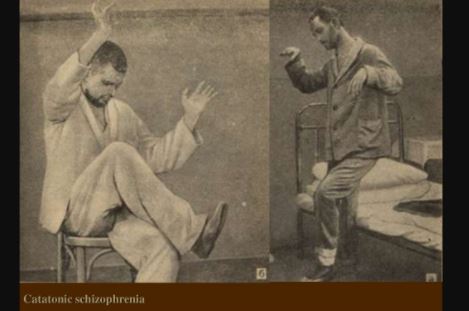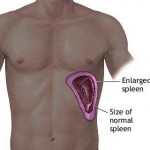Catatonic Schizophrenia
What is Schizophrenia?
Schizophrenia is a complex and rare mental disorder. It has been estimated that less than 1% of people worldwide have an increased risk of developing schizophrenia. Characteristic signs of this mental disorder are delusions and hallucinations which affect the person’s ability to have a normal social life. (1, 3)

Types of Schizophrenia
- Disorganized schizophrenia,
- Paranoid schizophrenia,
- Residual & Undifferentiated schizophrenia,
- Catatonic schizophrenia.
Symptoms
Schizophrenia symptoms are categorized as:
Positive
Delusions, hallucinations, disorganized speech, catatonic behavior, disorganized behavior, etc.
Negative
Diminished function, limited emotional expression, a limited productivity of speech and thoughts, etc.

Schizophrenia, a mental disorder
Catatonic schizophrenia is a rare subtype of schizophrenia characterized by catatonic symptoms. Catatonic symptoms can also be found in other mental disorders such as depressive disorders, psychotic bipolar disorders, etc.
A person with catatonic schizophrenia flips between periods of decreased and increased motor activity. Luckily, with today’s treatment, people affected by catatonic schizophrenia can control their signs and symptoms, increasing greatly the possibility of having an almost normal life. If left untreated, catatonic episodes can last for days and even weeks. (2, 3)
The following symptoms are characteristic for catatonic schizophrenia:
- Echolalia – mimicking the speech of another person,
- Echopraxia – mimicking the movements of another person,
- Mutism – limited verbal responses,
- Stupor – no interaction with the environment and other people around him/her,
- Negativism – no response at all or very little response to external stimuli,
- Mannerism – exaggerated actions,
- Agitation – without a real reason,
- Catalepsy – unusual postures,
- Posturing – holding a posture actively against gravity,
- Grimacing,
- Stereotypy – repeating movements constantly without a real reason, etc.
- At least three of the above – mentioned symptoms dominate the clinical picture of catatonic schizophrenia.
Other possible signs and symptoms, besides those mentioned – above which are characteristic for a catatonic state may appear in a person affected with schizophrenia, such as:
- Delusions,
- Hallucinations,
- Social withdrawal,
- Lack of motivation,
- Lack of emotional expression, etc.
Risk Factors
The real cause of schizophrenia is not determined until today. However, as it is a complex mental disorder it is believed that various factors have a role in the development of schizophrenia, including catatonic schizophrenia. Some possible risk factors or triggers of catatonic schizophrenia include: (3)
- Genetic factors,
- Psychological factors,
- Social factors,
- Infections during intrauterine life,
- Infections during early childhood,
- Fetal malnutrition,
- Childhood abuse and trauma,
- Drugs, etc.
Causes
The real cause of schizophrenia, including catatonic schizophrenia as one of the types, is not known until today. As mentioned, researchers indicate that schizophrenia as a complex mental disorder is caused by a brain dysfunction, but the real reason behind this brain dysfunction is not known. It is believed that a combination of the above – mentioned risk factors and triggers lead to the development of schizophrenia later in life.
It is also believed that an imbalance of certain neurotransmitters in the brain, such as dopamine have a key role in the onset of the signs and symptoms of schizophrenia. This imbalance of brain neurotransmitter dopamine is believed to have genetic causes. Serotonin levels, another brain neurotransmitter, are thought to have a role in the development of schizophrenia as well. (4)
Diagnosis
If catatonic schizophrenia is suspected, various tests and examinations are needed to evaluate the real state of a person’s mind. Common ordered medical and psychological tests include:
Physical examination of the patients is very important for the diagnosis is every medical condition, including catatonic schizophrenia. The patient’s height, body weight, blood pressure, heart rate, temperature and other physical parameters are measured and noted.
Complete blood count is a routine examination ordered by many doctors when trying to diagnose a certain medical condition. In cases of catatonic schizophrenia, a complete blood count can reveal the presence of certain drugs or alcohol in the blood which can contribute to catatonic schizophrenia. A thyroid function is checked as well.
MRI scan along with CT scan of the brain aim to reveal any possible abnormalities in the brain structures,
Electroencephalogram (EEG) aims to check the normal function of the human brain,
Psychological evaluation is perhaps the most important part of the examination, where the psychiatrist discusses with the patient his/her thoughts, feelings, wishes, fears, and behavior patterns. During a psychological evaluation, the onset of catatonic schizophrenia is discussed with the patient, their severity and how these symptoms have interfered with the patient’s everyday life. It is very important to ask and discuss with the patient any thoughts about harming themselves in order to determine any possible suicidal thoughts and temptations.
Diagnosing catatonic schizophrenia is not easy and it often requires some time. Other mental disorders such as seizures, substance abuse, severe depression, mania, etc., should be differentiated and ruled out. (3, 5)
Treatment
Schizophrenia is a life – long medical condition which requires permanent treatment. However, its catatonic symptoms may not always persist. The most important thing when it comes to dealing with any type of schizophrenia, including catatonic schizophrenia is taking the medications just as prescribed by the medical professional on a permanent basis even when it seems that the signs and symptoms of schizophrenia have subsided or totally disappeared and the affected person is feeling better, as they will reoccur. (2, 5)
Treatment of catatonic schizophrenia is basically the same as the other types of schizophrenia. Treatment is unique for every patient based on the severity of the signs and symptoms present, the overall health of the affected person and the presence of any other medical conditions, the patient’s age, etc.
Common medications used for the treatment of catatonic schizophrenia include:
- Benzodiazepines, the most commonly used medications for the treatment of catatonic schizophrenia, which act as tranquilizers. Benzodiazepines have the risk of dependency.
- Barbiturates, work by suppressing the central nervous system, rapidly relieving the symptoms of catatonia. There is a risk of dependency as well, just as with benzodiazepines.
- Antidepressants,
- Mood stabilizing medications, etc.
Other Treatment Options
Electroconvulsive therapy (ECT)
ECT which works by producing controlled seizures in the brain through an electric current. This form of treatment is usually used in cases of catatonia where medications have not given the desired effect. Possible side effects include a short – term memory loss.
Psychotherapy
It can be useful as a complementary therapy, even though medications are the main treatment. In severe cases of catatonic schizophrenia, psychotherapy has no effects at all.
Compliance
It means taking the medications just as prescribed by the doctor at the right time and in the given dosage. The main problem with schizophrenic patients is that they don’t take their medications for long periods of time, which significantly affects their life and the life of their families.
Social and vocational skills training
Aims to help people with catatonic schizophrenia to live an independent life.
Hospitalization
It is necessary in severe cases of catatonic schizophrenia when a mentally ill person presents a danger for himself but for other people around him as well.
REFERENCE:
- Schizophrenia from http://www.en.wikipedia.org/wiki/Schizophrenia
- Catatonic Schizophrenia: Symptoms, Causes, Treatment – http://www.mentalhealthdaily.com/2014/04/03/catatonic-schizophrenia-symptoms-cauaes-treatment
- Catatonic Schizophrenic – http://www.schizoprehnic.com/content/schizophrenia/diagnosis/catatonic-schizophrenia
- Causes of Schizophrenia – http://www.psychcentral.com/disorders/schizophrenia/causes-of-schizophrenia/
- http://www.mayoclinic.org/diseases-conditions/schizophrenia/diagnosis-treatement/diagnosis/dxc-20253209






